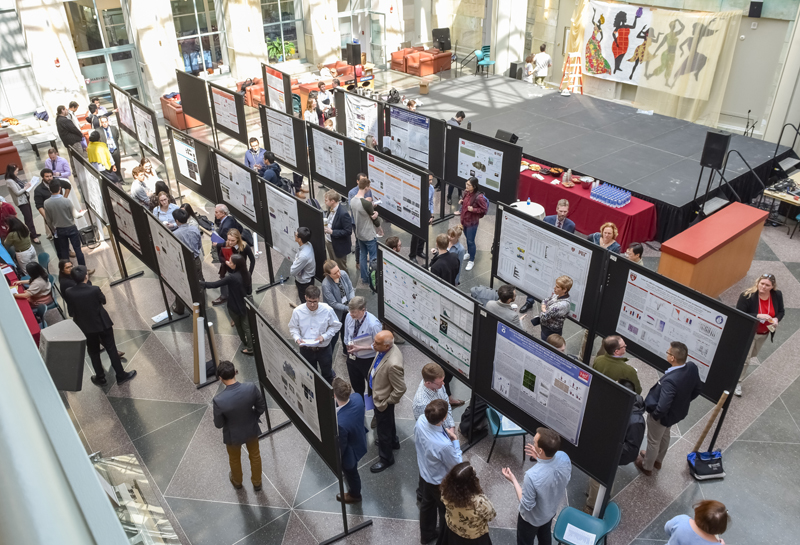
HST Forum Poster Session in TMEC Atrium. Photo Credit: Steve Lipofsky
Written by Jake Miller
Sometimes finding a new way of seeing the world brings exciting new scientific insights.
To witness the surprising interaction between developing blood cells and immune cells known as macrophages, and to glean new insights that may help improve human blood stem cell transplantation, HST MD student Brian Li peered through the translucent skin of developing zebrafish to watch the cells interact.
To coax hidden secrets from the highly-absorptive pigment melanin, HST PhD student Sam Osseiran used bursts of laser light that blaze as hot as the surface of the sun for pulses that last only a few quadrillionths of a second.
These are just two examples of nearly four dozen research projects presented by students in the Harvard-MIT Program in Health Sciences and Technology (HST) at the annual HST Student Research Forum held at Harvard Medical School in April.
The aim of the event is to showcase the potential of the HST approach, which combines training in clinical care, basic scientific research and engineering, in an effort to help students find new ways of seeing science that will improve understanding and treatment of diseases that cause human suffering.
One of the key ways HST students learn is by developing relationships with mentors in the Harvard and MIT community. Li works with Leonard Zon, professor of stem cell and regenerative biology at Harvard and the HMS Grousbeck Professor of Pediatrics at Boston Children's Hospital. Osseiran, a PhD student in HST’s Medical Engineering and Medical Physics (MEMP) PhD program, worked in the lab of Conor Evans, HMS assistant professor of medicine at the Massachusetts General Hospital Wellman Center for Photomedicine.
Beyond boundaries
While the research presented at the HST Forum was undertaken mainly in Boston-area labs, much of it reached well beyond the confines of any single lab and beyond the Boston area.
Anthony Nguyen, an HMS MD-PhD Student in the HST program, worked with his mentor Daniel Finley, HMS professor of cell biology, to deepen understanding of the radical transformation that red blood cells undergo when they develop from blood stem cells. What started as a basic science research question, building on discoveries that Finley made in 1995, ended up having surprising connections to human disease. “The project was an amazing opportunity to work with a world class cell biologist that also has profound implications for the health of people around the world,” Nguyen said. “Our attempts to deepen fundamental understanding of cell biology at the molecular level led to surprising connections with an illness that sickens 1.5 percent of the global population.”
To conduct her research, Nil Gural, another HST MEMP PhD student, travelled to Thailand to collect blood samples from people infected with malaria. Gural used microscale models of human livers grown in laboratory dishes to study the dormant stage of plasmodium, the parasitic microbes that causes malaria. She works in the lab of HST faculty member Sangeeta Bhatia, a Howard Hughes Medical Institute Investigator; the John J. and Dorothy Wilson Professor at MIT’s Institute for Medical Engineering and Science and in MIT’s Department of Electrical Engineering and Computer Science; and HMS lecturer on medicine at Brigham and Women’s Hospital.
To complete the study, Gural also worked with the Bill & Melinda Gates Foundation; clinics in Thailand; researchers at HMS, MIT and the Broad Institute; and the multinational pharmaceutical company Novartis. "This project wouldn't have been possible without all of my amazing collaborators, both here and overseas," Gural said. Her poster presentation won a Martha L. Gray Prize for Excellence in Research in the Bioinformatics and Integrative Genomics category.
A legacy of mentorship
Following the poster session, students and faculty gathered in the London Society’s homeroom, TMEC 209, for a plenary session. Students were welcomed by HST Directors Wolfram Goessling and Emery Brown.
The scientific talks were presented by Emma Fink, an MD-PhD student in the HST program and Benjamin Ebert, the HMS Nicola David-Pinedo Professor of Medicine, an institute member of the Broad Institute of MIT and Harvard, and chair of medical oncology at Dana-Farber Cancer Institute. They presented the results of their work together on thalidomide, a powerful anticancer drug notorious for having caused a wave of serious birth defects in the 1950s and 1960s when it was used as an anti-morning sickness drug. The research aimed to deepen the understanding of the molecular and structural basis for the drug’s ability to fight cancer and focused on building better drug safety tools.
Ebert and Fink met as teacher and student, developing a relationship as scientific collaborators—another partnership that exemplifies the power of HST’s model of mentorship, the speakers noted. "This forum demonstrates the depth and breadth of research performed by our HST MD and PhD students and highlights how our research mentors bring our students to surpass them," Goessling said.
Poster prizes were announced after the talks.